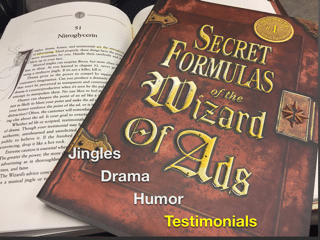Dash H. leaned on her cane and breathed in the smoke. A week before, she was steeping in pine with hints of fresh cut grass. Two days ago, the fire erupted. Hours later, she was tossing her favorite things into her truck and leaving her home. Forever? Now she was back. The fire did what fires do. It huffed. It puffed. It blew right up to her yard and then around. The fire didn’t beat her. Dash H. was looking at her home, unscathed.
When she came to record her public service announcement (PSA) about how she saved her home from wildfire, she had no script. “No problem. Let’s talk. I’ll turn on the microphone.”
Her 20-minute story was practical, vivid, and hopeful, yielding three 60-second PSAs. People would react to her message. My ears knew it. My gut confirmed it. Resolved: any future testimonials would start with an unscripted conversation.
 In Secret Formulas of the Wizard of Ads, Roy H. Williams reveals “the nitroglycerin of advertising.” He writes about jingles, drama, humor, and testimonials, “Used properly, these things have the power to move mountains for you. Handle them carelessly and they’ll blow up in your face.” Save your face. If you’re recording a testimonial, have a conversation.
In Secret Formulas of the Wizard of Ads, Roy H. Williams reveals “the nitroglycerin of advertising.” He writes about jingles, drama, humor, and testimonials, “Used properly, these things have the power to move mountains for you. Handle them carelessly and they’ll blow up in your face.” Save your face. If you’re recording a testimonial, have a conversation.
“Unpolished talent recording PSAs and commercials!?” say golden-toned announcers, “Blasphemy!”
Others say, “Stories are powerful. Tell it in your own words.”
The best actors embody the characters they portray. Instead of “actor portrayal,” what about using the actual you? Sure, you might need coaching, but if you’re willing to record your story, do it. Sounding “real” is difficult for announcers. Big boom announcers of the past never had this worry. The new reality is realness. In a Voices.com podcast “The Power of the Authentic Voice” and in her book, Meant to be Heard, voice coach Jocelyn Rasmussen explores finding that real voice, giving tips to speakers, singers, and voice actors. They’re helpful for all of us who go before the microphone.
One: If you’re tired, you’ll sound tired. Sometimes you have to make up for how you feel.
Two: Think about the script. Make it authentically yours. Recall a similar feeling you had.
Three: Breathe fully. Put a smile in your voice.
Rasmussen believes that when real words hit the hearers’ ears, the hearers take action. People eat up real. Jocelyn claims that the body also can feel it. When Dash H. told her story, the hair on my arms stood at attention. My eyes welled. She didn’t need a script.
Record your story. The wins. The losses. How you do it. Why you do it. The more engaged you become, the more your words find a home with listeners. For more on origin stories, read WOA partner, Jeff Sexton.
Two years after Dash H. shared her story, another came forward to tell his. He had heard Dash’s PSAs and took action. Later that summer, fire raged through his property. He saved his home. “I owe it to that gal on the radio.”
I’ve written and produced hundreds of commercials, but the first award I ever received for producing a message didn’t ruminate in my braincase and rattle off my keyboard. A woman living with multiple sclerosis sawed branches, raked needles, hauled wood, and told her story. It saved a home. That’s even better than a trophy.
You have a script? Sure…why don’t we talk first?
- Derby Cars and Critics Both Race to the Bottom. But Your Leadership Must Not. - October 5, 2023
- Are you overlooking something that’s holding you back? How my “aha!” moment could help. - September 14, 2023
- What Spartan Women Can Teach Us About Advertising - October 12, 2022

